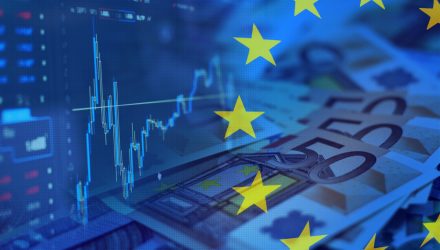A euro-related exchange traded fund strengthened Thursday after European Central Bank President Christine Lagarde provided an optimistic outlook on the eurozone’s economic recovery and the bloc’s currency.
The Invesco CurrencyShares Euro Currency Trust (NYSEArca: FXE), which tracks the euro currency against the U.S. dollar, rose 0.1% Thursday while the euro currency gained 0.1% against the U.S. dollar to $1.1814. FXE has increased by 4.6% year-to-date.
ECB President Lagarde said the bank is closely watching the currency, highlighting its recent strength against the greenback, and she adds that the eurozone economy is enjoying a strong rebound after a sharp contraction, the Wall Street Journal reports.
The ECB left its policy mix unchanged while it continues to monitor the impact of Covid-19. Policymakers said they would leave the key interest rate unchanged at minus 0.5% and continue to buy up to 1.35 trillion euros, or $1.59 trillion, in eurozone debt under its emergency bond-buying program.
“Looking ahead, a further sustained recovery remains highly dependent on the evolution of the pandemic and the success of containment policies,” Lagarde said after the policy decision was announced.
Europe’s economic recovery has slowed in recent weeks after an initially strong rebound. Looking ahead, ECB officials are concerned about possible job cuts and corporate bankruptcies later in the year after state subsidies wind down.
The iShares MSCI Eurozone ETF (BATS: EZU) gained 4.9% over the past 3 months but was still down 4.8% year-to-date.
Market observers, though, hope the bank could scale up its monetary stimulus by December, especially after Federal Reserve Chairman Jerome Powell said last month that policymakers are willing to allow inflation to run higher than to further support the labor market, signaling a major policy shift that could allow for interest rates to stay low for years, which would put pressure on the ECB to follow suit.
The euro currency has strengthened against the U.S. dollar in recent months, reflecting investor confidence in the Eurozone recovery and its quick response to the Covid-19 pandemic, compared to the U.S. However, some are worried that the stronger EUR could hurt the region’s export-heavy industries.
“Given that recoveries in the eurozone are often kick-started by net exports, a stronger euro could hamper any recovery going into the second half of the year and beyond,” Carsten Brzeski, an economist with ING Bank, told the WSJ.
For more information on the European markets, visit our Europe category.
